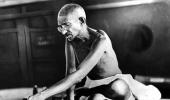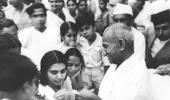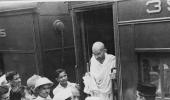'The sudden arrests and detentions of all the Congress Working Committee members led to mass satyagraha by Congressmen and civil disobedience.'
'I found myself helpless as the source of my income, from which I sent a portion to my parents in the village, had suddenly stopped.'
Glimpses from the memoirs of Chakkedath Sankarankutty Menon, the stenographer who worked for Mahatma Gandhi and Sardar Vallabhbhai Patel during the freedom struggle. The first of a multi-part series:
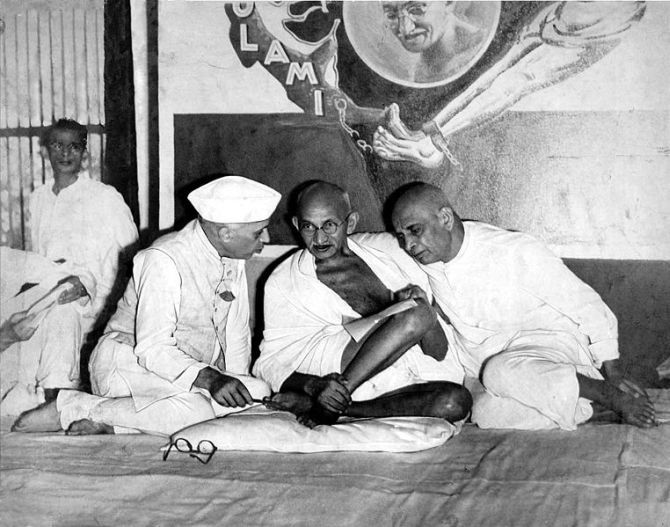
Before 1931, for about two years, I worked at a small firm in Bombay (now Mumbai).
In January 1931, I joined M/S T. S. Thadani & Sons, Exporters.
In early May of that year, the manager of the firm called me to his cabin and offered me a chance to work with the president and general secretary of the Congress.
In April 1931, the Karachi session of the Congress was presided over by Sardar Vallabhbhai Patel. Pandit Jawaharlal Nehru and Jairamdas Daulatram were elected general secretaries.
While Pandit Nehru was based in Allahabad, Sardar Patel and Jairamdas Daulatram had their headquarters at Bardoli (Surat district).
In connection with their work, I would have had to frequently travel between Bardoli, Ahmedabad and Bombay.
To work with the Congress in those days was considered to be risky as the police could take you away at any time.
Also, if my parents had come to know of my working for the Congress, they would have been frightened.
Considering this, I rejected the offer without hesitation though the manager kept reassuring me that nothing bad would happen to me and that it was for my good.
When he saw that I was firm, he said he would give me 24 hours to mull over the offer.
The next morning, when I reached office, to my amazement, I had to face Jairamdas Daulatram, who had come along with the manager.
I came to know that Jairamdas was a friend of the manager and stayed with him whenever he came to Bombay.
Jairamdas had come to the office to convince me to accept the offer.
I explained my apprehensions. I was assured by the manager that if I don't like working with the Congress, then I could get my job back whenever I wanted.
With this assurance, I agreed to go with Jairamdas. He asked me to reach Bombay Central station by 9.30 pm that same night with my luggage, to catch a 10 pm train to Bardoli (via Surat). He said he would get me a ticket; he also gave me some money to prepare for the journey.
We left for Bardoli in the night and reached there at about 9 am the next day. From the station, we drove to the Bardoli Ashram, which was about a mile away.
That was the beginning of my ashram life, with Sardar Patel and Jairamdas Daulatram.
Life was simple at the ashram. At tea time, we got a glass of milk, We got vegetarian meals without spices and condiments twice a day.
All the ashram's residents had to attend morning prayers at 4 am and evening prayers at 6 pm every day.
If I wanted a cup of tea, I had to go to the railway station to get it.
Life was simple and though I was fully occupied in work throughout the day, one did not feel exhausted.
During the course of our stay, Gandhiji came to the ashram for a couple of days.
Bhulabhai Desai (the lawyer and freedom activist) came for a longer period to represent the peasants of Bardoli before the Broomfield Commission, set up by the government, as the result of the successful satyagraha and the no rent campaign organised by the peasants of Bardoli under Sardar Patel's guidance and stewardship .
Both Sardar Patel and Jairamdas were so good and considerate to me that I felt quite at home in their company.
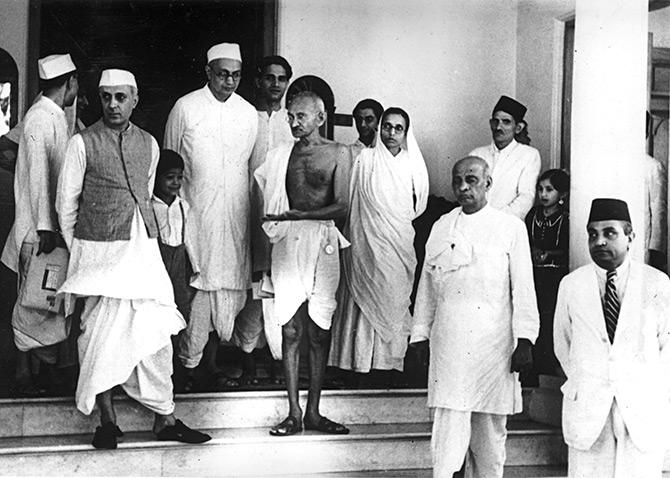
For the common man, Sardar Patel was the ferocious 'Iron Man' and he would seem so to anyone who looked at him.
While he was indeed ruthless towards his enemies, to others, he was a large-hearted person. He would come across as humourous and considerate to his friends and common people alike.
While Sardar Patel looked ferocious, Jairamdas was an incarnation of sympathy, calmness. He was the most considerate person for everybody around him.
In their company, I had nothing to complain and I felt at home.
Very often, the three of us used to visit Ahmedabad and Bombay from Bardoli.
While in Ahmedabad, Sardar Patel used to stay with Dr Kanugo at Ellis Bridge and I used to stay at Congress house. On one or two occasions, I stayed with the general secretary of the local Congress organisation who lived near Dr Kanugo's house and used to go to Sardar Patel from there to work with him.
Whenever we came to Bombay, Sardar Patel used to stay with a friend at the Sri Ram mansion near Prarthana Samaj and Jairamdas stayed with his friend Dingoomal, manager of Thadani & Sons, at Forjett Street (both in present day South Mumbai). I used to stay at Congress house.
The Second Round Table Conference in London towards the end of 1931 was attended by Mahatma Gandhi on behalf of the Indian National Congress. He returned to India on January 1, 1932.
Both Sardar Patel and Jairamdas arrived in Bombay to attend the proposed Congress Working Committee to hear from Gandhiji about the conference and the decisions arrived therein.
Soon after Gandhiji's arrival in Bombay, the Congress Working Committee meeting was held and he explained to the committee what had transpired at the conference.
He told the committee that, in his opinion, the British government was not, in any way, prepared to part with power in India and for the attainment of freedom, the Indian National Congress and all other people fighting for freedom would have to resort to civil disobedience and satyagraha without delay.
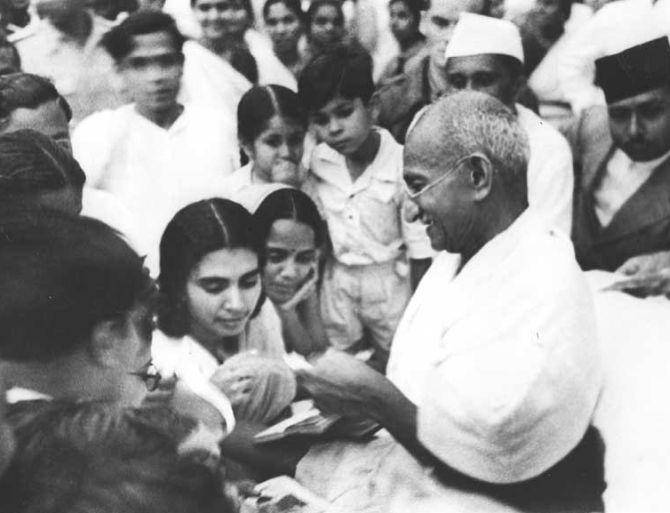
Gandhiji's call provoked the government and, if I am correct, in the early hours of 5th January (it was 4th January), 1932, the police arrived and arrested all the Working Committee members from their respective residences. They shifted Gandhiji and Sardar Patel to Yervada Jail in Poona.
The rest, including Jairamdas, were sent to the Ahmednagar Fort for detention. Jawaharlal Nehru was sent to Naini prison.
Early the next morning, the newspapers headlined the arrests of the Congress leaders and their removal outside Bombay.
I was staying with a friend at Matunga (present day north central Mumbai). The news was a shock for me, and I felt orphaned.
Only the previous evening, while leaving for the day, I had seen Sardar in good spirits and never suspected any sudden political developments.
Maniben Patel, Sardar Patel's unforgettable daughter, was by his side at that time.
The sudden arrests and detentions of the Congress Working Committee members led to mass satyagraha by Congressmen and civil disobedience by others who sympathised with the cause.
I found myself helpless as the source of my income, from which I sent a portion to my parents in the village, had suddenly stopped.
At the same time, I could not plunge myself into the fray and invite arrest or detention.
So, I recalled the promise Dingoomal, the manager of T S Thadani and Sons, had made to me while I was leaving to join the Indian National Congress, that I could return to my old job at any time.
I approached Dingoomal in his office and told him about my difficulties, but he declined to take me back because his business was adversely affected due to the sudden turn in the political situation.
I was again in the wilderness.
Translated from the Malayalam by Pottayil Aravindakshan Nair.
Feature Presentation: Aslam Hunani/Rediff.com

